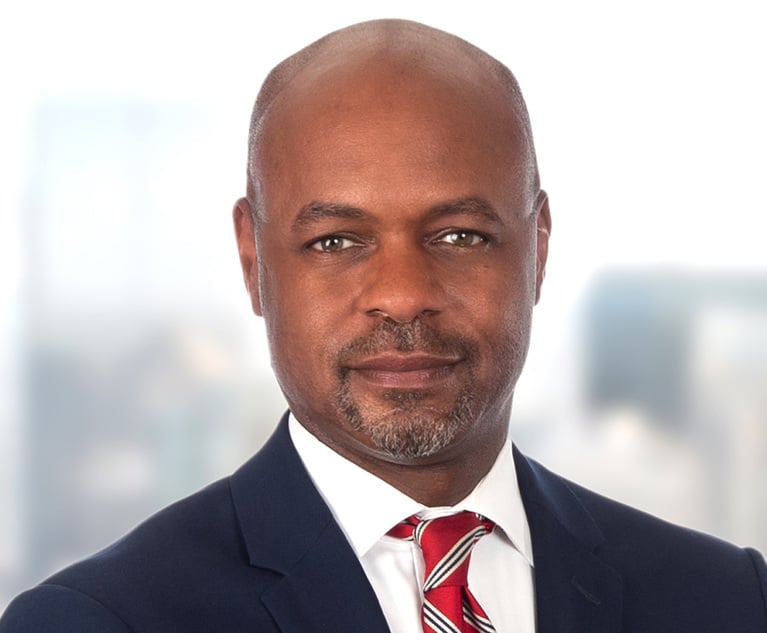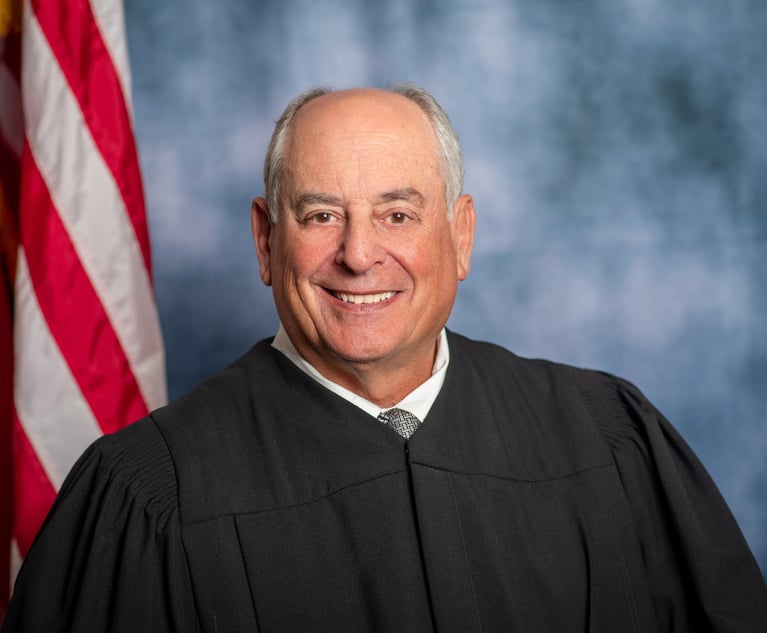 David Cross of Morrison & Foerster, Washington, D.C. (Photo: Photo: Diego M. Radzinschi/ALM)
David Cross of Morrison & Foerster, Washington, D.C. (Photo: Photo: Diego M. Radzinschi/ALM)Paper Ballot Plaintiffs Want Georgia Sanctioned for Alleged Discovery Violations
A motion filed by Morrison Foerster seeks $300,000 in sanctions against Georgia Secretary of State Brad Raffensperger and his office.
October 14, 2019 at 05:13 PM
6 minute read
Attorneys representing Georgia voters who want to force the state to conduct future elections with paper ballots, have asked a federal judge to sanction the secretary of state and order him to pay nearly $300,000 in legal fees and costs for allegedly obstructing discovery.
In a motion filed late Friday, attorney David Cross of Morrison & Foerster in Washington, D.C., contended that Georgia Secretary of State Brad Raffensperger "obstructed and delayed discovery" of the state's obsolete election management server and databases for months based on "a falsehood."
In the motion, Cross contends sanctions are warranted because Raffensperger's counsel—three of whom are special assistant state attorneys general—falsely claimed in multiple court pleadings and teleconferences that the Global Election Management System used by the state since 2002 is so unique, confidential and sensitive that even the plaintiffs' cybersecurity experts couldn't be trusted with copies in highly secure environments. Known as GEMS, the server and databases include ballot templates and vote tabulations for every election and are used to program memory cards for Georgia's electronic voting machines.
The plaintiffs have fought to examine the GEMS server and databases to determine whether they were infected with malware or otherwise compromised while they were left open on the internet for an undetermined period of time before and after the 2016 presidential election. At that time, Georgia was one of several states targeted by Russian intelligence officers allegedly seeking to interfere with the U.S. presidential election.
Raffensperger's lawyers have argued the state's election equipment remained secure from hackers and that the plaintiffs raised "only spectral fears" that the voting apparatus could be hacked and votes miscounted.
After Georgia's GEMS databases were turned over, Cross said their cybersecurity experts discovered they are exactly like publicly available GEMS databases from other jurisdictions and contain virtually no confidential information.
Cross said in his motion that plaintiffs counsel also learned at a July hearing that, although the state vigorously fought against turning over the GEMS databases to the plaintiffs' experts, citing potential security breaches, the same databases used in the 2018 election were created by three offsite contractors in their homes without verifiably secured conditions or confidentiality agreements to safeguard them.
"The state engaged in what looks to be a concerted campaign to mislead us, the court, and the public about the fact that Georgia's election management system is neither unique nor confidential," Cross said Monday. "This included repeated misrepresentations to us and the Court, which persisted even after we specifically directed the state to other GEMS databases available online—including from Cobb County—that readily debunked their claims."
"It's unclear what the state was trying to hide, but we wasted hundreds of thousands of dollars fighting their obstruction and wasted many hours in the weeks leading up to the preliminary injunction hearing," he continued. "In the end, the state indicted its own election system by arguing that the GEMS database structure provides a 'roadmap' to hack Georgia's elections—and the state ultimately was forced to admit that that 'roadmap' has been publicly available on the internet for years. We're entitled to recover our wasted fees and costs from the state, and the Court should send a compelling message that such misconduct is not appropriate and will not be tolerated."
Cross, a team of Morrison & Foerster lawyers, and Atlanta attorney Halsey Knapp of Krevolin & Horst represent three Georgia voters who are lead plaintiffs in the suit. Cross was joined in the motion by Atlanta attorneys Bruce Brown and Cary Ichter, and Seattle attorney Robert McGuire, who represent several other Georgia voters and the Coalition for Good Governance, a nonprofit organization dedicated to election transparency.
Attorneys Joshua Belinfante and Vincent Russo of Atlanta's The Robbins Firm and Bryan Tyson of the Atlanta offices of Taylor English Duma are defending Raffensperger, along with the secretary's general counsel, Ryan Germany. Belinfante was not available for comment. Russo, Tyson, and two representatives for Raffensperger couldn't be reached for comment.
Cross said in his motion that the costs to the plaintiffs were significant. Cross bills at $1,065 an hour, and three associates bill at hourly rates ranging from $650 to $800. Brown bills $650 an hour, and David Brody, counsel and senior fellow with the Lawyers' Committee for Civil Rights Under Law, who is also working for the coalition plaintiffs, bills at $400 an hour. Nearly $100,000 in requested fees are for the plaintiffs' election cybersecurity experts, according to the motion.
The sanctions motion follows one filed by the plaintiffs' lawyers asking for $5.6 million in legal fees and expenses following U.S. District Judge Amy Totenberg's August order barring Georgia from using its paperless, 17-year-old electronic voting equipment after Jan. 1. The state is purchasing a new electronic system that Raffensperger is promoting across the state as including a paper ballot feature.
Raffensperger has objected to any award of fees and costs to the plaintiffs lawyers until the court has entered a final judgment. Totenberg's August order was a preliminary injunction that allowed the state leeway to let local elections go forward in November using the current equipment.
State lawyers also claimed that the plaintiffs lawyers did not provide sufficient documentation to support their request for fees and expenses, and that costs associated with their experts exceeded per diem limits for federal witnesses.
State lawyers also objected to more than $26,000 the plaintiffs paid the secretary of state to produce public records, arguing there is "no evidence" the records were necessary, and that discovery would have been a less costly way of obtaining the same records.
This content has been archived. It is available through our partners, LexisNexis® and Bloomberg Law.
To view this content, please continue to their sites.
Not a Lexis Subscriber?
Subscribe Now
Not a Bloomberg Law Subscriber?
Subscribe Now
NOT FOR REPRINT
© 2025 ALM Global, LLC, All Rights Reserved. Request academic re-use from www.copyright.com. All other uses, submit a request to [email protected]. For more information visit Asset & Logo Licensing.
You Might Like
View All
Georgia Supreme Court Honoring Troutman Pepper Partner, Former Chief Justice
2 minute read
'A 58-Year-Old Engine That Needs an Overhaul': Judge Wants Traffic Law Amended
3 minute read
Appeals Court Removes Fulton DA From Georgia Election Case Against Trump, Others
6 minute read
Family of 'Cop City' Activist Killed by Ga. Troopers Files Federal Lawsuit
5 minute readTrending Stories
- 1Deal Watch: Latham, Paul Weiss, Debevoise Land on Year-End Big Deals. Plus, Mixed Messages for 2025 M&A
- 2Bathroom Recording Leads to Lawyer's Disbarment: Disciplinary Roundup
- 3Conn. Supreme Court: Workers' Comp Insurance Cancellations Must Be Unambiguous
- 4To Avoid Conflict, NYAG Hands Probe Into Inmate's Beating Death to Syracuse-Area DA
- 5Scripture-Quoting Employee Sues Company for Supporting LGBTQ Pride
Who Got The Work
Michael G. Bongiorno, Andrew Scott Dulberg and Elizabeth E. Driscoll from Wilmer Cutler Pickering Hale and Dorr have stepped in to represent Symbotic Inc., an A.I.-enabled technology platform that focuses on increasing supply chain efficiency, and other defendants in a pending shareholder derivative lawsuit. The case, filed Oct. 2 in Massachusetts District Court by the Brown Law Firm on behalf of Stephen Austen, accuses certain officers and directors of misleading investors in regard to Symbotic's potential for margin growth by failing to disclose that the company was not equipped to timely deploy its systems or manage expenses through project delays. The case, assigned to U.S. District Judge Nathaniel M. Gorton, is 1:24-cv-12522, Austen v. Cohen et al.
Who Got The Work
Edmund Polubinski and Marie Killmond of Davis Polk & Wardwell have entered appearances for data platform software development company MongoDB and other defendants in a pending shareholder derivative lawsuit. The action, filed Oct. 7 in New York Southern District Court by the Brown Law Firm, accuses the company's directors and/or officers of falsely expressing confidence in the company’s restructuring of its sales incentive plan and downplaying the severity of decreases in its upfront commitments. The case is 1:24-cv-07594, Roy v. Ittycheria et al.
Who Got The Work
Amy O. Bruchs and Kurt F. Ellison of Michael Best & Friedrich have entered appearances for Epic Systems Corp. in a pending employment discrimination lawsuit. The suit was filed Sept. 7 in Wisconsin Western District Court by Levine Eisberner LLC and Siri & Glimstad on behalf of a project manager who claims that he was wrongfully terminated after applying for a religious exemption to the defendant's COVID-19 vaccine mandate. The case, assigned to U.S. Magistrate Judge Anita Marie Boor, is 3:24-cv-00630, Secker, Nathan v. Epic Systems Corporation.
Who Got The Work
David X. Sullivan, Thomas J. Finn and Gregory A. Hall from McCarter & English have entered appearances for Sunrun Installation Services in a pending civil rights lawsuit. The complaint was filed Sept. 4 in Connecticut District Court by attorney Robert M. Berke on behalf of former employee George Edward Steins, who was arrested and charged with employing an unregistered home improvement salesperson. The complaint alleges that had Sunrun informed the Connecticut Department of Consumer Protection that the plaintiff's employment had ended in 2017 and that he no longer held Sunrun's home improvement contractor license, he would not have been hit with charges, which were dismissed in May 2024. The case, assigned to U.S. District Judge Jeffrey A. Meyer, is 3:24-cv-01423, Steins v. Sunrun, Inc. et al.
Who Got The Work
Greenberg Traurig shareholder Joshua L. Raskin has entered an appearance for boohoo.com UK Ltd. in a pending patent infringement lawsuit. The suit, filed Sept. 3 in Texas Eastern District Court by Rozier Hardt McDonough on behalf of Alto Dynamics, asserts five patents related to an online shopping platform. The case, assigned to U.S. District Judge Rodney Gilstrap, is 2:24-cv-00719, Alto Dynamics, LLC v. boohoo.com UK Limited.
Featured Firms
Law Offices of Gary Martin Hays & Associates, P.C.
(470) 294-1674
Law Offices of Mark E. Salomone
(857) 444-6468
Smith & Hassler
(713) 739-1250






